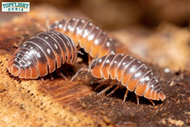Clown Isopods: A Comprehensive Care Guide
Posted by Lucy Bennett on Jun 30th 2025
Clown isopods have bright, intense colors that differ between sexes. They are one of the few isopods with unique patterns all over their bodies. They are excellent additions to any terrarium or bioactive substrate.
These incredible species, scientifically called Armadillidii klugii, are native to the mediterranean and have become relatively popular among breeders and lovers of exotic pets.
This detailed guide from TopFlight Dubia teaches you how to care for clown isopods and keep them happy in a terrarium.
Getting to Know Clown Isopods
Freshwater crustaceans are commonly appreciated for their vivid, clownish red, yellow, and black colors.
These fascinating creatures are vital to watch in terrariums as they help decompose organic matter.
At maturity, they grow up to 1-2 cm in size, making them good pets.
Let's look at the factors you must consider to create the right environment for your pet.
01. Enclosure Selection
The best container for clown isopods is one with proper aeration. Sequencing tanks should be made of a glass terrarium or transparent plastic tub with a mesh cover. Ensure the enclosure has enough floor space; these isopods don’t like to crawl on walls.
02. Substrate Requirements
The substrate supports their ability to dig and is mandatory in providing moisture for the juveniles. A mix of:
- Coconut coir
- Sphagnum moss
- Leaf litter
This causes high humidity, a nutrient-rich water that resembles their natural biosphere.
03. Humidity & Temperature
These isopods can adapt well to conditions that range from slightly to highly humid (60-80 %).
This means that the substrate of the terrarium remains moist, except it does not flood it constantly, so it won’t always be wet. The perfect thermal level lies between 68 and 78°F or 20 and 25°C.
A hygrometer and a thermometer should measure these conditions.
04. Hiding Spots
Although these insects will thrive in sunlight, you should offer them some sections of the habitat where they can dig in or take shelter because isopods are nocturnal. Refuge areas are essential because they make the isopods feel safe.
Feeding Habits
Isopods generally feed on dead and decaying organic matter, and clown isopods are no exception. However, they need a good variety of food sources in captivity.
Their diet should include:
- Leaf Litter: Their primary food source.
- Fruits and Vegetables: Smaller pieces of carrot, zucchini, and apple make good use of the food. Avoid foods rich in anti-caking agents, such as citrus.
- Protein: Fish flakes or dried shrimp should occasionally be offered to supply nutrients.
Take out leftover food periodically. If it is moist for a long time, mold develops, which is hazardous to isopods.
Clown Isopod Maintenance
01. Cleaning the Enclosure
It indicates they are naturally designed to feed on decomposing matter, but the terrarium needs regular cleaning. Empty the feeder and any additional waste containers at least weekly. Replace the substrate once within 6-12 weeks.
02. Population Management
They breed readily in the appropriate conditions. However, it may be impossible to accommodate many isopods in this enclosure, so it is best to release some of them or find a larger space to build a home for them.
03. Monitoring Health
Live healthy clown isopods are moving and bright in color. It is possible to note the decreased performance of a group under stress or sickness, for example, too weak colors indicating unfavorable conditions.
Interaction & Observation
Although clown isopods are fun pets, observing them is very interesting. Seeing them forage, play together, and dig is enjoyable and calming.
Offer a variety of foods, like different textures of bark and moss, to ensure they remain happy and healthy.
Conclusion
It is relatively fun and rewarding to be a clown isopod caregiver. Your pet will become familiar with your love, touch, appropriate environment, and proper nutrition.
Whether you’re an old hand at isopod care or a first-timer, clown isopods add a pop of multicoloration to your habitat.

